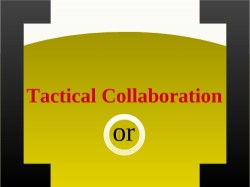 [I was on a panel called “The Open Professoriat(e)” at the 2011 MLA Convention in Los Angeles, in which we focused on the dynamic between academia, social media, and the public. My talk was an abbreviated version of a post that appeared on samplereality in July. Here is the text of the talk as I delivered it at the MLA, interspersed with still images from my presentation. The original slideshow is at the end of this post. Co-panelists Amanda French and Erin Templeton have also posted their talks online.]
[I was on a panel called “The Open Professoriat(e)” at the 2011 MLA Convention in Los Angeles, in which we focused on the dynamic between academia, social media, and the public. My talk was an abbreviated version of a post that appeared on samplereality in July. Here is the text of the talk as I delivered it at the MLA, interspersed with still images from my presentation. The original slideshow is at the end of this post. Co-panelists Amanda French and Erin Templeton have also posted their talks online.]
Rather than make an argument in the short time I have, I want to make a provocation, urging everyone here to consider the way social media can enable what I call tactical collaborations both within and outside of the professoriate.
I’ve always had trouble keeping the words tactic and strategy straight. Or, as early forms of the words appear in the OED, tactick and the curiously elongated stratagematick.
This quote comes from a 17th century translation of a history of Roman emperors (circa 240 AD).
I love the quote and it tells me that tactics and strategy have always been associated with battle. But I still have trouble telling one from the other. I know one is, roughly speaking, short term, while the other is long range. One is the details and the other the big picture.
I’ll blame the old board game Stratego for my confusion. The placement of my flag, the movement of my scouts, that seemed tactical to me, yet the game was called Stratego.
Even diving into the etymology of the words doesn’t help much at first: Tactic is from the ancient Greek τακτóς, meaning arranged or ordered.
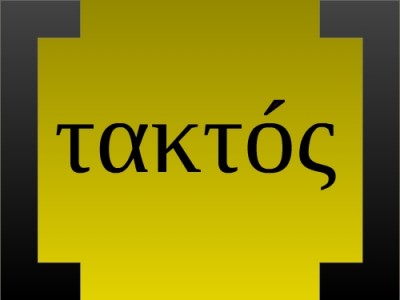 While Strategy comes from the Greek στρατηγóς, meaning commander or general. A general is supposed to be a big-picture kind of guy, so I guess that makes sense. And I suppose the arrangement of individual elements comes close to the modern day meaning of a military tactic.
While Strategy comes from the Greek στρατηγóς, meaning commander or general. A general is supposed to be a big-picture kind of guy, so I guess that makes sense. And I suppose the arrangement of individual elements comes close to the modern day meaning of a military tactic.
All of this curiosity about the meaning of the word tactic began last May, when Dan Cohen and Tom Scheinfeldt at the Center for History and New Media at George Mason University announced a crowd-sourced book called Hacking the Academy. They announced it on Twitter on Friday, May 21 and by Friday, May 28, one week later, all the submissions were in. 330 submissions from nearly 200 people.
The collection is now in the final stages of editing, with a table of contents of around 60 pieces by 40 or so different authors. It will be peer-reviewed and published by Digital Culture Books, an imprint of the University of Michigan Press. As you can imagine, the idea of crowdsourcing a scholarly book, in a week no less, generated excitement, questions, and some worthwhile skepticism.
And it was one of these critiques of Hacking the Academy that prompted my thoughts about tactical collaboration. Jennifer Howard, a senior reporter for The Chronicle of Higher Education, posed several questions that would-be hackers ought to consider during the course of hacking the academy. It was Howard’s last question that resonated most with me.
Have you looked for friends in the enemy camp lately? Howard cautioned us that some of the same institutional forces we think we’re fighting might actually be allies when we want to be a force for change. I read Howard’s question and I immediately began rethinking what collaboration means. Instead of a commitment, it’s an expedience. Instead of strategic partners, find immediate allies. Instead of full frontal assaults, infiltrate and disseminate.
In academia we have many tactics for collaboration, but very little tactical collaboration.
And this is how I defined tactical collaboration:
I’m reminded of de Certeau’s vision of tactics in The Practice of Everyday Life. Unlike a strategy, which operates from a secure base, a tactic, as de Certeau writes, operates “in a position of withdrawal…it is a maneuver ‘within the enemy’s field of vision’” (37).
De Certeau goes on to add that a tactic “must vigilantly make use of the cracks….It poaches in them. It creates surprises in them. It can be where it is least expected” (37).
So that’s what a tactic is. I should’ve skipped the OED and Stratego and headed straight for de Certeau. He teaches us that strategies, like institutions, depend upon dominance over space—physical as well as discursive space. But tactics rely upon momentary victories in and over time. Tactics require agility, surprise, feigned retreats as often as real retreats. They require collaborations that the more strategically-minded might otherwise discount. And social media presents the perfect landscape for these tactical collaborations to play out.
Despite my being here today, I’m very skeptical of institutions and associations. We live in a world where we can’t idly hope for or rely upon institutional support or recognition. To survive and thrive, humanists must be fleet-footed, mobile, insurgent. Decentralized and nonhierarchical. We need to stop forming committees and begin creating coalitions. We need affinities over affiliations, and networks over institutes.
Tactical collaboration is crucial for any humanist seeking to open up the professoriate, any scholar seeking to poach from the institutional reserves of knowledge production, any teacher seeking to challenge the ever intensifying bureaucratization and Taylorization of learning, any contingent faculty seeking to forge success and stability out of contingency.
We need tactical collaborations, and we need them now. The strategematick may be the domain of emperors and institutions, but like the word itself, it’s quaint and outdated. Let tactics be our ruse and our practice.
Bibliography
Certeau, Michel de. The Practice of Everyday Life. Berkeley: University of California Press, 1984. Print.
Herodian. Herodians of Alexandria his imperiall history of twenty Roman caesars & emperours of his time / First writ in Greek, and now converted into an heroick poem by C.B. Staplyton. London: W. Hunt, 1652. Web. 14 July 2010.
Image Credits
(1) Chase, Andy. Stratego. 2009. <http://www.flickr.com/photos/usonian/3580565990/>.
(2) ;P, Mayu. f1947661. 2008. <http://www.flickr.com/photos/mayu/4778962420/>.
(3) Unger, John T. “American Guernica: A Call for Guerilla Public Art.” <http://johntunger.typepad.com/studio/2005/10/the_guernica_pr.html>.
(4) Oppenheim, Dennis. Reading Position for Second Degree Burn. 1970. <http://www.artinfo.com/news/enlarged_image/21237/14781/>.
(5) Bauman, Frederick. Stratego Family. 2007. <http://www.flickr.com/photos/livingfrisbee/1499088800/>.
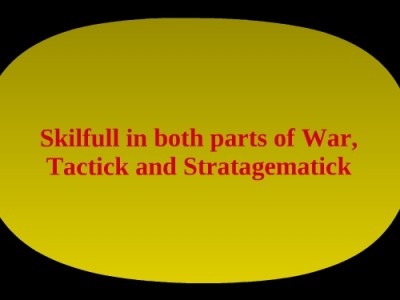

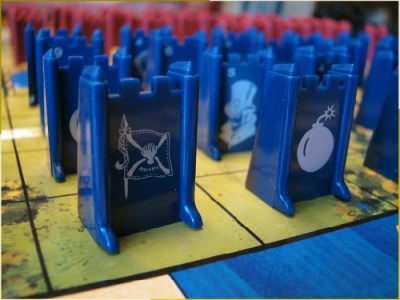
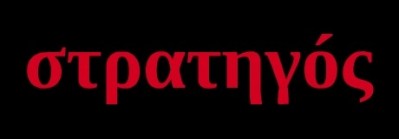
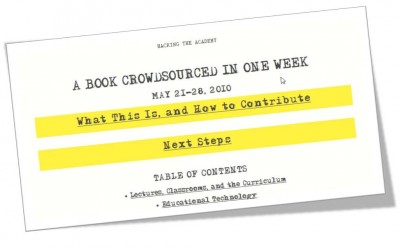
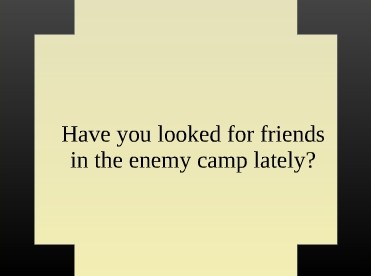
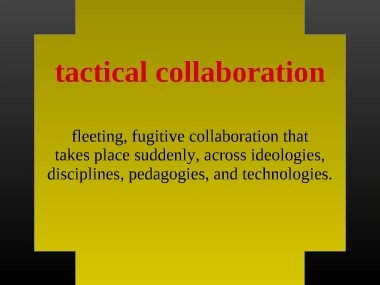

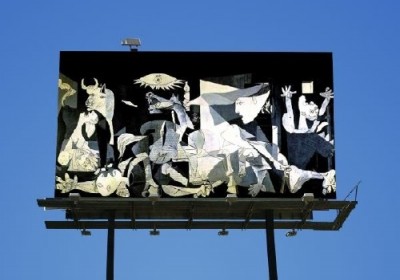



Very interesting, Mark. Love the images. And yes, it did provoke.
We have enemies, true enough. And I try to imagine how we humanities academics can outflank (battle metaphor!) those who would just as soon shut down the organized conversations we call scholarship, leaving behind only a labor force (the cheaper the better) for teaching utilitarian skills to a kingdom of managers and employees.
Emphasizing networks and collaborations *sounds* like a way to outflank our enemies and reach the many folks who are potential allies–folks young and old who are deeply interested in stories, histories, open questions, and what they frequently call their “journey.” Our institutions have sometimes blocked us off fro these potential allies.
But. If we de-emphasize our institutions (associations, departments, tenure, role in university governance), why wouldn’t that mean allowing our enemies a chance to outflank *us*? After all, our enemies talk of networks and collaboration, too–and when they use those words, they have something in mind for us that I wouldn’t like to see. And is it possible our enemies are powerful because they have linked themselves to institutions–and tried to delegitimize those they want to banish?
Do you think it’s possible that–far from being too wedded to institutions–we have taken them for granted, and now are losing the battle because we are losing the territories (institutional and discursive) that have supported scholarship, transmission, and liberal arts teaching?
Hi, I really enjoyed this post.
I’ve found it by accident when browsing your blog and the word tactic attracted my attention.
It came in a good moment as I’m finishing a dissertation on the phenomenon of cooperation. Have you published a paper in this presentation in the proceedings of the 2011 MLA Convention in Los Angeles?
Is it available online?
Thanks.
[…] I’ll be identifying open-minded language instructors for tactical collaboration, somewhat as discussed recently by Mark Sample. I’m happy to have some fruit borne of this plan already, a presentation proposal […]
[…] within the realm of formal committee work, but even outside of it. There, the overlap with Mark Sample’s ideas around “tactical collaboration” are obvious, so perhaps we can convince Mark to grace us with his presence (and his ideas) as part […]